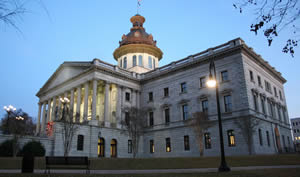One of the objectives of the SC state preservation plan is to “enhance education of students in preservation-related fields”, by increasing communication and collaboration with educational institutions, and providing field experiences for students while assisting communities. Focusing on this objective has been beneficial to the SHPO and to the preparation of new professionals. SC believes it is something we could all make progress on even in the face of declining budgets. The SC SHPOffice hopes that if these students land in your state that they are familiar with SHPO programs and know that SHPOs are vital preservation partners and allies.
South Carolina is fortunate to have a range of programs including the American College of the Building Arts(traditional trades), University of South Carolina (USC) (Public History, archaeology/anthropology), Clemson University / College of Charleston (historic preservation), and College of Charleston (historic preservation and community planning). Here are some examples of how they’ve worked together:
- Graduate assistants from the USC Public History program provide vital help with administrative tasks and research in the SHPO office (Section 106, National Register, and beyond). The students gain work experience and receive financial assistance. They have also had several students complete shorter internships that resulted in National Register nominations and updated publications.
- As part of mitigation for an adverse effect, the applicant provided funding to USC for a graduate student to research and prepare a historic context.
- For the past several years, the graduate program at the Clemson University / College of Charleston has participated in Advocacy Day, with 8 to 12 students travelling to Washington, DC to participate in congressional visits.
- Instructors routinely invite SHPO staff to guest lecture about programs from National Register to tax credits to Section 106. Students often attend state review board meetings for the National Register, both to observe and to present nominations that they have prepared in class.
- Class projects have directly benefitted their programs, from photographs of NRHP properties in Charleston for the web, to NRHP nominations (both districts and individual properties) to historic property surveys and historic contexts. Students and faculty have also presented their projects and research at their statewide preservation conference.
